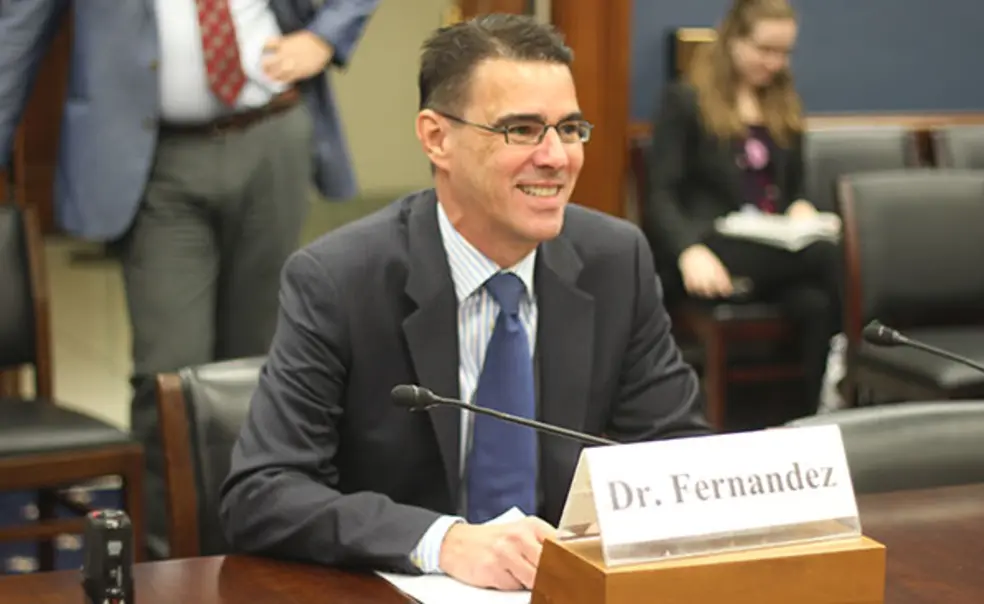Michael Fernandez ’83 Aims to Bring Scientific Evidence to Policy Conversations
Michael Fernandez ’83 trained as a biologist but also has a knack for public policy. And in today’s political climate, he sees a need for people who can communicate complex issues to policymakers by laying out the facts clearly to those who may not be experts.
“What we want to do is tell them a story with evidence,” Fernandez said. “It’s about how we developed and collected this information, why is it important, what does it tell us, and what does it not tell us.”
As the inaugural director for the Center for Scientific Evidence in Public Issues at the American Association for the Advancement of Science [AAAS], Fernandez has been tasked with creating an organization to serve as a go-to source of information for policymakers.
At the moment, Fernandez is the center’s lone employee, and he is actively recruiting people to join. His objective is to determine what issues the center should focus on, with a special emphasis on policy debates where underlying scientific evidence would better inform the public.
Fernandez emphasizes that he is currently in “listening mode” and does not find it productive to tell policymakers and the public that “if only [they] understood the science behind this thing, [they] would make better decisions.” Instead, he spends time trying to understand how different people approach specific issues and how to better communicate with others. He also plans to host several “stakeholder engagement sessions” around the country to frame the issues that policymakers care most about.
Previously, Fernandez served as a staff member for the U.S. Senate Committee on Agriculture, Nutrition, and Forestry, a special assistant at the EPA, and an associate administrator at the USDA’s Agricultural Marketing Service. He also has nonprofit experience (at the Pew Initiative on Food and Biotechnology), worked in the private sector (as the senior director for global public policy at Mars Inc.), and has recent links to academia (as a senior fellow in George Washington University’s Sustainability Collaborative).
Fernandez said that after leaving Mars in 2016, he began to reflect on his career, thinking specifically about how to leave a lasting impact. He’d held an AAAS fellowship as a Ph.D. student at the University of Chicago, and when he heard about the group’s new idea for a center connecting scientists and policymakers, he was immediately interested.
“This was a new opportunity to think about science and evidence as important in public policymaking,” he said. “We are trying to help people appropriately evaluate and value scientific evidence.”
Fernandez wants the center to help policymakers learn more about the key scientific concepts that underlie policy questions with a strong evidence component. That could mean understanding how lead leaches from water pipes (as in the Flint, Mich., water crisis) or getting a better grasp on high-tech fields like artificial intelligence. Fundamentally, he wants to reestablish the value of those who bring specialized knowledge to the table at a time when, he said, it seems that “expertise is being undervalued.”












1 Response
Richard Seitz ’75
7 Years AgoA Worthy Effort
I wondered at the creation of this new scientific entity to advise when the National Academies of Science, Engineering & Medicine already exist to give the latest scientific updates to Congress and the public. Reading the links, I find myself agreeing with Mr. Hernandez on the need for more concise information as the NASEM reports are book-length and so compendious that the gold nuggets are lost in the gravel. For example, the Pax Good Behavior Game for schools is noted in several Institute of Medicine reports (now NASEM) as a universal prevention strategy that could reduce substance abuse by 50-70 percent along with a litany of other benefits (crime, delinquency, ADHD, suicide, special ed.), but the three paragraphs extolling GBG are lost in the 300 pages of each report (ditto the U.S. Surgeon General’s Facing Addiction report in November 2016). However the stated intent to not advocate for specific actions means that politicians will continue to pick and choose from the scientific findings to suit their agenda. If Mr. Hernandez can overcome that, it will be a worthy effort.